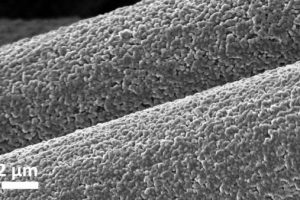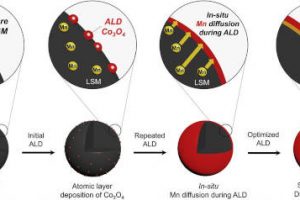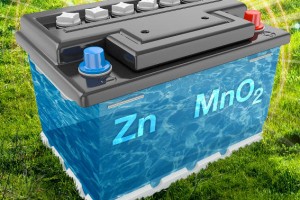For grid-scale energy storage, the search is on for durable batteries made from low-cost materials. Aqueous zinc-iron batteries are one suggestion, where storage is though the reversible plating and stripping of zinc at the anode. One of the problems associated with this chemistry (dendrite growth is another) is hydrogen gas generation from parasitic side-reactions that decompose water – which gradually ...
Tag Archives: zinc
Aluminium batteries take a step closer
Researchers at Cornell University have taken a step closer towards viable aluminium batteries – that might, for example, one day be used in grid-scale storage. Aluminium is more plentiful and cheaper that lithium, making it potentially attractive for large-scale energy storage even if the technology never became light enough for automotive or phone use. Aluminium also has the advantage over ...
A step on the road to metal-air vehicle batteries?
Batteries that breath air are a possible future for electric vehicles, as they might significantly cut the weight of energy storage. Called metal-air batteries, during discharge they react a metal (lithium, zinc, magnesium or aluminium, amongst other options) with oxygen from the atmosphere to deliver energy. During charge, they emit the oxygen. A catalyst is required to get oxygen to ...
Zinc rechargeable battery gets UL verification
A zinc rechargeable battery, being developed by NGK of Nagoya, Japan, has acquired UL verification based on the UL 9540A standard. NGK’s battery uses zinc as the negative electrode, aqueous solution as the electrolytic solution, and an NGK ceramic separator as a barrier between the positive and negative electrodes. Batteries that employ zinc as the negative electrode have a high ...
Zinc sponge anode makes Li-ion alternative rechargeable
The US Navy has created a rechargeable aqueous zinc battery with performance approaching Li-ion cells. While useful in non-rechargeable applications – it is the basis for ‘alkaline cells’ – zinc electrodes tend to grow dendrites (whiskers) when charged, wrecking the cell. Scientists at the US Naval Research Laboratory (NRL) have created nickel-zinc batteries with 3D sponge zinc anode instead of ...
Zinc-ion cell lasts 1,000 cycles to 80%
Chemists at the University of Waterloo in Canada are claiming to have developed a long-lasting zinc-ion battery. It is said to use non-flammable non-toxic materials and a pH-neutral water-based salt, consisting of a water-based electrolyte, a pillared vanadium oxide positive electrode and a metallic zinc negative electrode. Inside, positively-charged zinc ions are oxidized from the zinc metal negative electrode, travel ...
Old zinc battery tech gets new life
US researchers have stretched the operating life of aqueous zinc-manganese oxide batteries to over 5,000 cycles. The result is a rechargeable battery that cost only as much as a car battery but store more energy, according to the US Pacific Northwest National Laboratory, which is grooming the technology for matching renewable energy sources to power grid loads. Aqueous zinc-manganese oxide ...
 Electronics Weekly Electronics Design & Components Tech News
Electronics Weekly Electronics Design & Components Tech News




